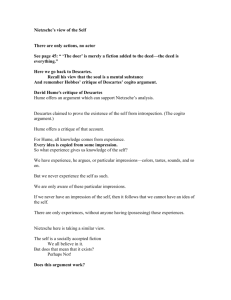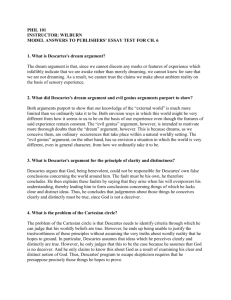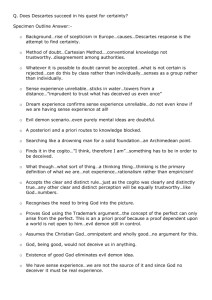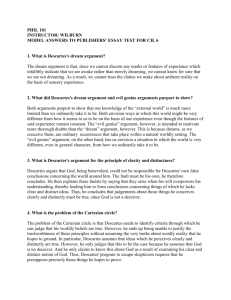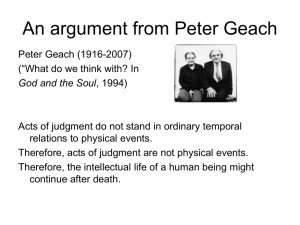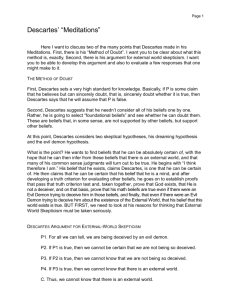Revision for Descartes` Meditations
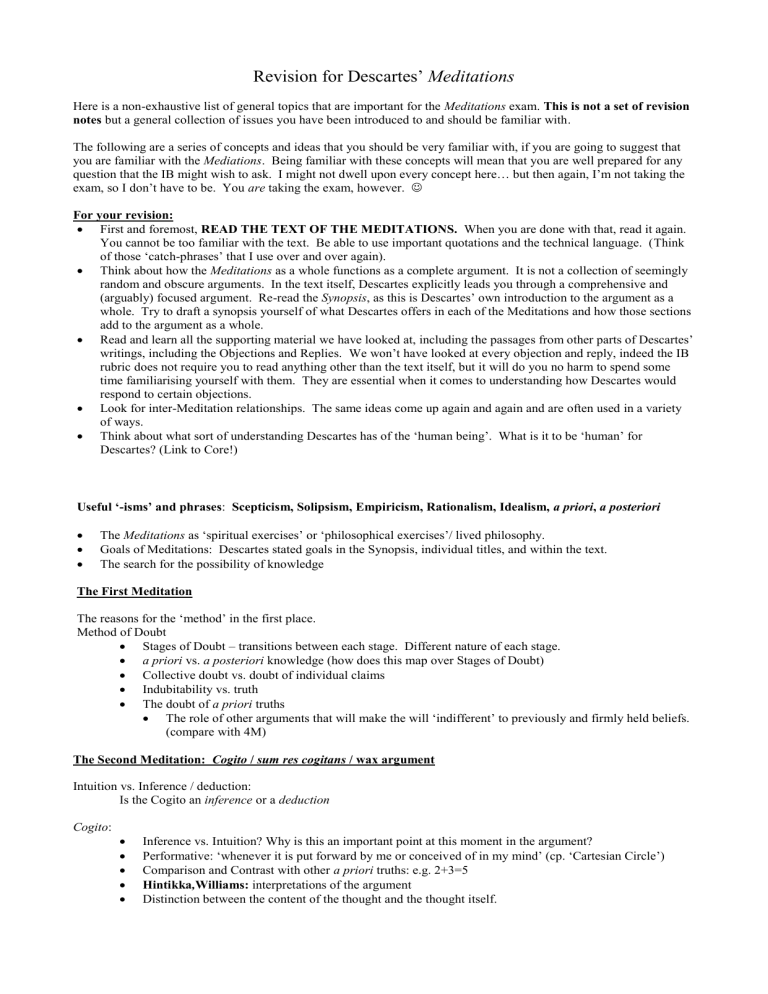
Revision for Descartes’
Meditations
Here is a non-exhaustive list of general topics that are important for the Meditations exam. This is not a set of revision notes but a general collection of issues you have been introduced to and should be familiar with.
The following are a series of concepts and ideas that you should be very familiar with, if you are going to suggest that you are familiar with the Mediations . Being familiar with these concepts will mean that you are well prepared for any question that the IB might wish to ask. I might not dwell upon every concept here… but then again, I’m not taking the exam, so I don’t have to be. You are taking the exam, however.
For your revision:
First and foremost, READ THE TEXT OF THE MEDITATIONS.
When you are done with that, read it again.
You cannot be too familiar with the text. Be able to use important quotations and the technical language. (Think of those ‘catch-phrases’ that I use over and over again).
Think about how the Meditations as a whole functions as a complete argument. It is not a collection of seemingly random and obscure arguments. In the text itself, Descartes explicitly leads you through a comprehensive and
(arguably) focused argument. Re-read the Synopsis , as this is Descartes’ own introduction to the argument as a whole. Try to draft a synopsis yourself of what Descartes offers in each of the Meditations and how those sections add to the argument as a whole.
Read and learn all the supporting material we have looked at, including the passages from other parts of Descartes’ writings, including the Objections and Replies. We won’t have looked at every objection and reply, indeed the IB rubric does not require you to read anything other than the text itself, but it will do you no harm to spend some time familiarising yourself with them. They are essential when it comes to understanding how Descartes would respond to certain objections.
Look for inter-Meditation relationships. The same ideas come up again and again and are often used in a variety of ways.
Think about what sort of understanding Descartes has of the ‘human being’. What is it to be ‘human’ for
Descartes? (Link to Core!)
Useful ‘-isms’ and phrases : Scepticism, Solipsism, Empiricism, Rationalism, Idealism, a priori, a posteriori
The Meditations as ‘spiritual exercises’ or ‘philosophical exercises’/ lived philosophy.
Goals of Meditations: Descartes stated goals in the Synopsis, individual titles, and within the text.
The search for the possibility of knowledge
The First Meditation
The reasons for the ‘method’ in the first place.
Method of Doubt
Stages of Doubt – transitions between each stage. Different nature of each stage.
a priori vs. a posteriori knowledge (how does this map over Stages of Doubt)
Collective doubt vs. doubt of individual claims
Indubitability vs. truth
The doubt of a priori truths
The role of other arguments that will make the will ‘indifferent’ to previously and firmly held beliefs.
(compare with 4M)
The Second Meditation: Cogito / sum res cogitans / wax argument
Intuition vs. Inference / deduction:
Is the Cogito an inference or a deduction
Cogito :
Inference vs. Intuition? Why is this an important point at this moment in the argument?
Performative: ‘whenever it is put forward by me or conceived of in my mind’ (cp. ‘Cartesian Circle’)
Comparison and Contrast with other a priori truths: e.g. 2+3=5
Hintikka,Williams: interpretations of the argument
Distinction between the content of the thought and the thought itself.
Sum Res Cogitans
‘Thought alone is inseparable from me’
Definition of ‘Essence’ for Descartes Inseparability (compare with 5M)
Role of the imagination (cp. 6M)
Unity of Consciousness: Why are all the ‘modes’ of thought that were doubted in 1M not included as part of the mind in 2M?
Wax Argument
Role and function of the Argument
What it does and does not establish.
Role of the imagination.
The ‘Cartesian theatre’: the idea that our ‘selves’ are distanced from the world and that the world is presented to us through sense perception.
Third Mediation
Descartes’ worry whether there are any objects outside of his mind and the worry whether or not they
‘resemble’ or ‘conform’ to his idea of them…
‘clear and distinct ideas are true’
The Role of God in Descartes’ argument
Types of ideas – those that can and cannot be true or false
The role of the origins of the ideas in the argument of 3M
Adventitious / Invented (5M!) / Innate
The Example of the 2 sizes of the sun (2M & 3M)
Representation Theory of Ideas
Causal Principle
The principle in general and in its application to ideas – find and memorise the quotations!
a priori ? (cf. Hume)
Substance vs. Mode of a Substance
Objective vs. Formal Reality of Ideas
Objections to ‘Trademark Argument’
Objections to the nature of the idea of God
Learn the various objections (many of which are anticipated by Descartes in the text) and Descartes’ replies
Cottingham’s discussion of the ‘supremely perfect computer’ and Descartes response that his idea is complete enough.
Negative idea / materially false / cumulative / not coherent
Objections to Descartes use of Causation
Is causation a priori ?
Why does this function as an objection? What if Descartes replies, “Fine I learned about causation through experiencing causation in the world”
Argument from Existence
The Fourth Meditation
The argument that God is no deceiver and the final destruction of the final stage of doubt.
The source of error – a sort of epistemological theodicy
Faculties of knowledge and the will – their origin and nature
‘The scope of the will is greater than that of the intellect’
‘great inclinations’ of the will to assent to certain propositions
ways in which ‘indifference’ of the will can be introduced toward certain propositions especially in the face of other arguments.
The Cartesian Circle
formulation of the problem
5M discussion of it (AT 69-71)
Cottingham’s use of cognitio and scientia
Fifth Meditation
Ontological Argument
Existence as a Predicate, Existence as a Property
Grammatical Predicate, Logical property
Anslem and Kant
‘cannot have been invented by me’
‘true and immutable natures’
Supremely Perfect Being
Alston and Modes of Existence, and the conclusions drawn from this.
Sixth Meditation
‘Argument’ for Material Objects
The role of 6M in the overall project: Why argue for the Real Distinction?
Argument for the existence of material objects
Distinction between Intellect and Imagination
“Human Being” & “Mind” & “Body” – the ‘notions’ and what can be clearly and distinctly understood from considering them.
the “Real Distinction”
Argument from Clear and Distinct Perception
Argument from Divisibility
Argument from Doubt
Interactionism and its problems.
Cartesian Dualism:
Minds and bodies are distinct substance (“Substance Dualism”)
2 Way Causal Interatction


